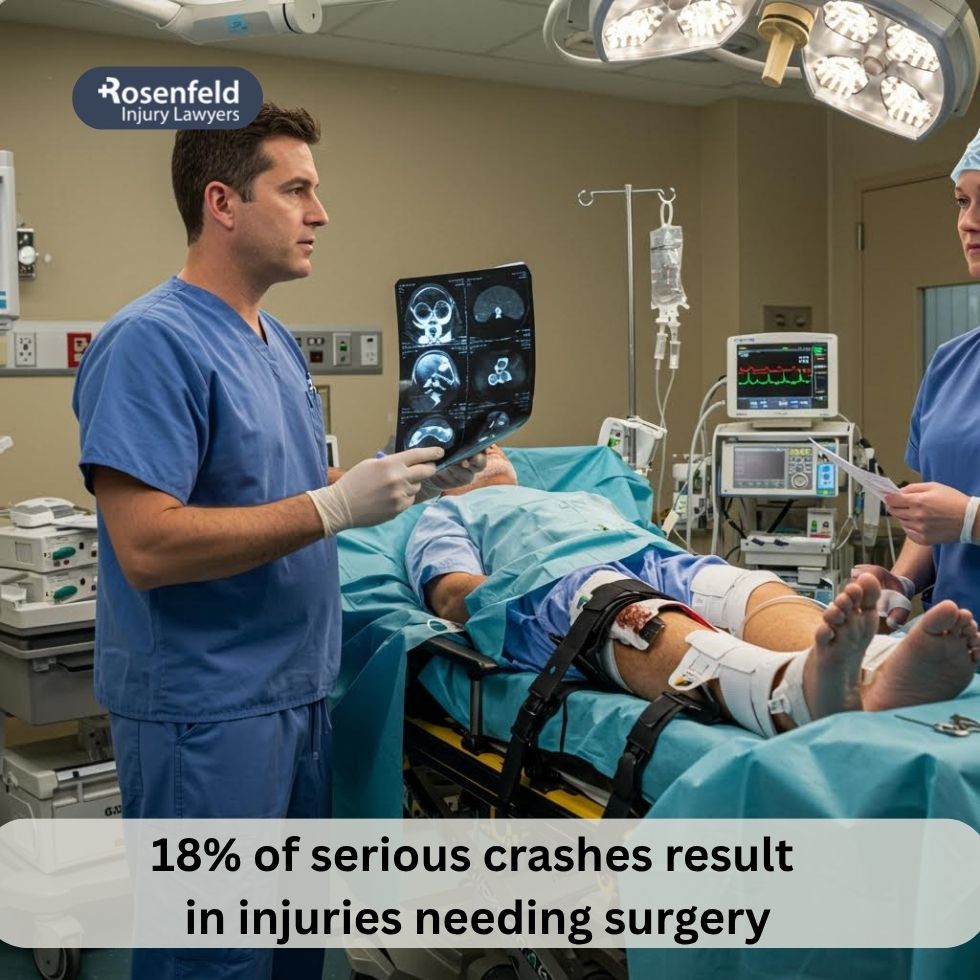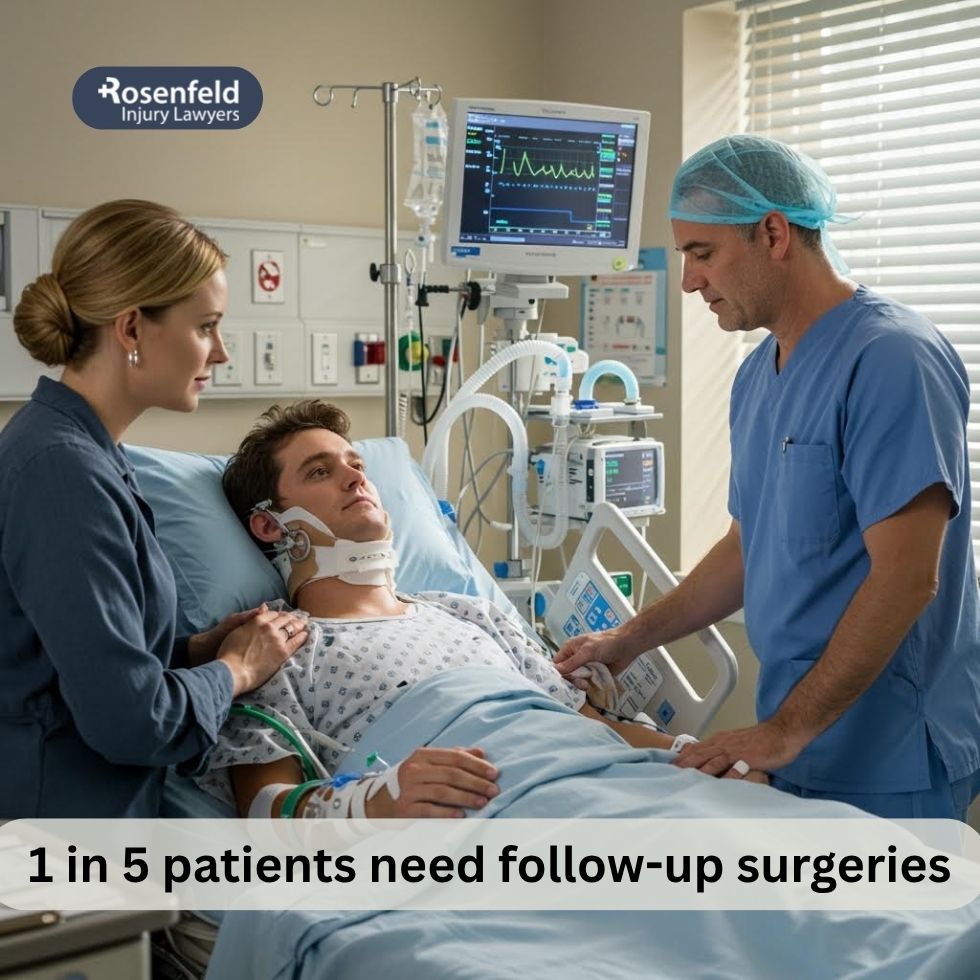- 24/7 Free Consultation: (888) 424-5757 Tap Here To Call Us
9 Common Injuries That Require Surgery After a Car Accident
Car accidents can leave victims facing far more than superficial injuries. When the damage is serious enough to require surgery, the physical, emotional, and financial toll can last for months or years. Surgery after a car accident often marks the beginning of a lengthy recovery period, especially when spinal cord injuries, head trauma, or internal damage are involved.
If you’ve been injured in a serious car accident, understanding your medical options—and your legal rights—can help you protect your health and pursue full financial compensation. A Chicago car accident lawyer can provide guidance tailored to your situation, especially when surgical procedures are required.

Car Crash Injuries That May Require Surgery
Some collision injuries, like spinal cord damage, torn ligaments, or brain injuries, require surgery when conservative care isn’t enough. Medical evidence helps prove the need for surgery and strengthens your claim for a larger car accident settlement.
1. Back Injuries
Back injuries are one of the most common reasons people need surgery after a serious car accident. The spinal cord is especially vulnerable to high-speed trauma. Some back injuries involve damage to the spinal discs, while others affect the spinal nerves or two or more vertebrae.
Spinal fusion surgery may be required to stabilize the spine, especially if spinal cord damage is present. Many spinal cord injuries affect long-term mobility and pain management, making early diagnosis and surgical support critical.
2. Neck Injuries
Neck trauma can result in serious injuries that interfere with movement and daily function. A herniated disc or fractured vertebra in the cervical spine may require neck surgery to relieve pressure on the spinal cord or surrounding nerves.
Pinched nerve pain, reduced mobility, and spinal instability are all signs that surgical procedures may be needed. Like spinal surgery, neck surgery often involves a lengthy recovery period and regular physical therapy to restore strength.
3. Knee Injuries
Knee surgery is frequently required after high-impact collisions. Car accident victims often experience severe injuries to the knee, including ACL or MCL tears, meniscus damage, and knee fractures that require immediate medical attention. These conditions can severely limit mobility and cause long-term complications if left untreated.
Most soft tissue injuries in the knee won’t heal fully without treatment. Torn soft tissue often requires reconstructive or minimally invasive surgery to restore stability. Recovery usually involves months of physical therapy and limited weight-bearing, which can make everyday movement challenging.
4. Herniated Discs
Herniated discs are a common result of blunt trauma during a car accident. When the disc material pushes against the spinal cord or nerves, patients may experience sharp pain, numbness, or muscle weakness.
Spinal surgery may involve discectomy or spinal fusion to relieve pressure and stabilize the spine. In many cases, herniated disc settlements range between $65,000 and $360,000, reflecting the severity of pain, disruption to daily life, and the need for long-term care.
5. Rotator Cuff and Shoulder Injuries
Shoulder injuries can involve soft tissue damage to the rotator cuff, labrum, or joint. A torn rotator cuff may not heal fully without surgical repair, especially if the tendon is fully detached.
Surgical intervention may involve reattaching the tendon or removing bone spurs that cause inflammation. Severe shoulder pain, limited motion, and long-term disability are common outcomes without treatment.
6. Internal Organ Damage
Internal injuries are some of the most life-threatening consequences of a car crash. Internal bleeding or damage to organs like the spleen, liver, or lungs can require emergency surgery.
In cases of blunt force trauma, surgical procedures are often the only way to stop internal bleeding or repair torn tissues. Damage to internal organs can cause complications even after discharge, requiring continued monitoring and pain management.
7. Brain Injuries
Severe brain injuries may call for brain surgery to relieve pressure, stop bleeding, or remove damaged tissue. Traumatic brain injuries can cause swelling inside the skull, which puts pressure on the brain and creates dangerous complications.
Even when successful, brain surgery may be followed by a long recovery. Accident victims with severe brain injury often need cognitive therapy, lifestyle changes, and ongoing support for emotional and psychological symptoms.
8. Facial and Cosmetic Injuries
Cosmetic injuries may involve fractured cheekbones, jaw damage, or scarring from deep cuts or burns. Reconstructive surgery aims to restore both function and appearance.
These injuries affect self-esteem, quality of life, and social confidence. In serious cases, more than one surgical procedure is needed to repair the broken bones and damage caused by facial trauma or lacerations.
9. Fractured Bones
Not all fractured bones heal cleanly. When a broken bone is displaced, crushed, or misaligned, surgical procedures are often necessary to restore function.
Surgical repair may involve plates, rods, or screws to hold the bone in place. Severe fractures or compound breaks that pierce the skin require immediate surgical intervention to prevent infection and improve healing.

Common Surgeries for Car Accident Injuries and the Role of Insurance
The recovery process from car accident injuries often continues well after surgery. Many patients require physical therapy, pain management, and rehabilitation, particularly for spinal injuries or joint repair. Even minimally invasive procedures can involve a lengthy healing process.
Some of the most common surgeries after a car accident include:
- Spinal fusion to stabilize the vertebrae and relieve pressure on spinal nerves.
- Knee ligament repair for torn ACL, MCL, or meniscus.
- Open reduction and internal fixation (ORIF) to realign a broken bone using plates or screws.
- Craniotomy or brain surgery to relieve swelling after head injuries.
- Soft tissue repair for torn tendons, ligaments, or muscle, especially when soft tissue injuries cause severe pain or affect mobility.
- Emergency abdominal surgery to stop internal bleeding.
- Surgery for facial trauma or complex injuries involving multiple areas.
Many of these common surgeries require immediate surgery and follow-up medical attention to avoid complications. Yet insurance companies often question the necessity of these interventions. They might argue your condition was pre-existing or that the treatment wasn’t essential.
Working with a personal injury attorney can help document your treatment plan, demonstrate the true cost of recovery, and fight back when insurers minimize the impact of your surgery.
How an Experienced Car Accident Lawyer Can Help

A skilled car accident attorney can gather medical records, prove your need for surgery, and challenge insurance delays or denials. Under the Illinois Insurance Code, insurers who act in bad faith by delaying or refusing valid claims may be penalized. Your attorney can use this statute to hold them accountable and fight for the full compensation you’re owed.
Legal support also ensures your case complies with the Illinois statute of limitations (735 ILCS 5/13-202), which gives you two years from the date of the accident to file a personal injury lawsuit.
Additionally, if there is a dispute over fault, Illinois’ modified comparative negligence law allows you to recover damages as long as you’re found to be less than 50% at fault.
If you’re facing surgery after a car accident, our Chicago legal team is here to help. We offer free consultations and work on contingency, meaning you pay nothing unless we win.
Call (888) 424-5757 or fill out our online form.
All content undergoes thorough legal review by experienced attorneys, including Jonathan Rosenfeld. With 25 years of experience in personal injury law and over 100 years of combined legal expertise within our team, we ensure that every article is legally accurate, compliant, and reflects current legal standards.







